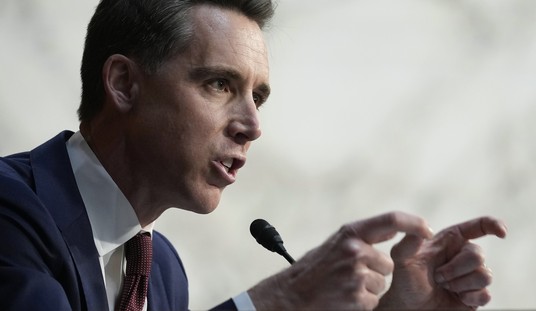WASHINGTON -- One gets the sense that voters are increasingly impatient with the GOP's seemingly interminable primary battles to choose a nominee who can beat President Obama.
After an exhausting primary season of bitter debates, plus unending TV attack ads, an untold number of gaffes, embarrassing memory meltdowns and even a scandal that drove an early front-runner from the race, the contest may still have a long way to go.
It seems as though this race has been going on forever, and reporters are picking up complaints that the contest has run far too long and voters want to pick the nominee sooner rather than later.
Primary battles cost a lot of money, and they can deplete the party's war chest for the general election to come. There's also the danger the party will be so bitterly divided, and the nominee so bloodied, that the candidate will be too weak to mount a credible campaign.
I don't buy any of that. I think our system of running the prospective candidates through a long gantlet of caucuses and primaries is exactly what is required to ensure that we weed out the worst and weakest among them, dig out the skeletons in their closets, and test their ability to mount a well-financed national campaign that can go the distance.
One of the singular manifestations of the GOP's search for a nominee in the 2011-12 election cycle has been the surprisingly large number of early contenders who sped to the top of the polls, only to see their support vanish, forcing them from the race.
We had a former pizza chain executive who wanted to impose the first national sales tax in American history, on top of all the other sales taxes, and about whom relatively little was known. A sordid womanizing scandal forced him to suspend his campaign.
Recommended
Then there was the folksy, late-entry Texas governor who cut ahead of everyone in line simply on the basis of being a chief executive of a big state that had created lots of jobs. It turned out he couldn't express himself very well, often went all but silent in the TV debates and couldn't remember the name of a huge federal department he said he would abolish. He never recovered.
Then came a former speaker of the House who had led his party to victory in the mid-1990s, after 40 years in the minority. He shot ahead in the polls after fiercely attacking the moderator in one of the early debates. He fell behind, only to make a second comeback, only to collapse when it was apparent that he was clearly not presidential material. He finished in last place in Illinois Tuesday.
The party primary system we have now was developed to vet candidates like these and to cool the passions of the voters who may get swept away by a slick, Elmer Gantry-sounding politico, only to discover he lacks substance, stability, focus and a broad base of support.
So here we are, after having endured primary contests in 34 states, with the field effectively winnowed down to just two candidates: former Massachusetts governor Mitt Romney and former Pennsylvania senator Rick Santorum.
Each has weaknesses and strengths. But at this writing it now appears Romney is going to be the nominee -- the steady, focused, long-distance runner who knows that cross-country races are won by marathoners with stamina, not by sprinters who fade in the homestretch.
It hasn't been an easy sale for the former businessman who helped start countless companies that have become household names and now employ tens of thousands of Americans. But in the end, he stayed focused on the No. 1 issue that will decide if Barack Obama is a one-term president: a weak, slow-growth, jobless economy.
Santorum, however, doesn't see the economy as the overriding issue of this election. In the past month, he has said there are "other issues besides the economy," seemingly dismissing its importance in the large scheme of things.
Reporters who regularly cover his campaign say that he rarely talks about the economy and jobs, sticking to the religious and social issues that he feels most comfortable talking about to his socially conservative and evangelical base.
As if to reinforce how he seeks to separate himself from Romney's laser-beam focus on the Obama economy, the former senator told voters this week, "I don't care what the unemployment rate is going to be. It doesn't matter to me."
After Romney jumped on the remark, saying his rival seemed to be dismissing the issue that most voters say is their chief concern, Santorum responded with this weak explanation: "I'm saying my candidacy doesn't hinge on whether the unemployment rate goes up and down."
Santorum's campaign was so worried this week about how his personal opposition to contraceptives was playing among women voters that his wife Karen went on CNN to say: "Women have nothing to fear. When it comes to contraceptives, he will do nothing on that issue."
Meantime, Santorum's campaign also suffers from his complete inability to run a major national campaign organization. This was embarrassingly evident in his failure to meet the delegate filing requirements in many states. Not only did he lose badly in Illinois, but he was ineligible for 10 of its delegates because his campaign had not filed the correct paperwork.
Putting together a well-organized, well-financed national campaign is a key professional prerequisite in the long primary season, and Romney has done that from the ground up. Santorum has been hobbled by a relatively small staff and no state-by-state national campaign apparatus to speak of.
As things stand now, Romney has won half of the GOP delegates he needs to clinch the nomination, and ahead of him is a long line of state primaries where he is favored to do well and that will put him at or over the top.
The Gallup Poll reports that Romney leads Santorum by 11 points in the head-to-head surveys -- and leads the president by 50 to 46 percent. The nomination battle is all but over.

























Join the conversation as a VIP Member